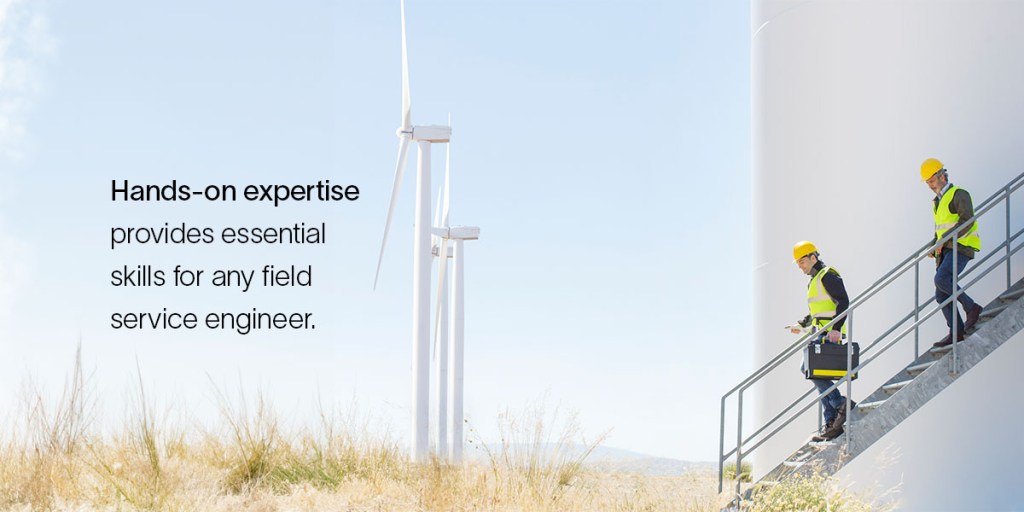
Field service engineers provide clients with various critical services. Those who develop the qualities of a successful field engineer can enjoy a dynamic, challenging and rewarding career. These skilled and educated individuals provide invaluable services in industries such as health care, manufacturing and telecommunications.
This exciting role works particularly well for people with curious and technical minds. Using their expertise in engineering, they help troubleshoot equipment and maintain uptime for different clients. Anyone considering a career as a field service engineer must understand the skills and tasks associated with the job to make the best possible career choice.
What Is a Field Service Engineer?
A field service engineer works on-site with various clients, installing, maintaining and repairing equipment and technological systems. A field service engineer’s job description can be broad and varied, covering systems from security, lighting and machinery to scientific equipment and computer hardware. Field service engineers can work for multiple clients and perform various duties depending on the job requirements.
A field service engineer’s salary varies depending on the specific client’s requirements. However, the average salary for a field service engineer in the United States exceeds $80,000 annually. The job involves a combination of hands-on experience, technical skills and education. Field service engineers form a crucial part of after-sales support, maintaining client relationships and handling various daily challenges.
The Qualities of a Successful Field Service Engineer
At its core, a field service engineer role involves providing excellent customer service and displaying excellent technical and troubleshooting skills. An accomplished field engineer can troubleshoot crucial problems quickly, reducing downtime and strengthening customer relationships. Potential field service engineers should cultivate the following skills:
- Adaptability: Field service engineers face various challenges and surprises during their workday. They may receive weekend requests or multiple calls every day. They must adapt to new situations quickly to meet customer demands and cultivate a solution-focused outlook.
- Patience: A field service engineer faces complex and time-consuming problems. They also need to handle customers frustrated due to downtime on critical equipment. People in this profession must maintain appropriate emotions and carefully consider each action’s outcomes.
- Time management: Field service engineers serve as representatives of their organizations, which requires always responding to customer concerns and maintaining the appropriate etiquette. The position also requires keeping track of various tools and appointments and factoring in travel to different locations.
- Problem-solving and critical thinking: Identifying and resolving issues quickly and effectively makes up a large portion of any field service engineer’s position. Candidates must have excellent problem-solving skills to save time and resources while maintaining the safety of people using the equipment.
- Technical skills: Field service engineers need various technical skills to perform their job duties, including IT and equipment knowledge.
- Communication: A field service engineer often links their organization and the client. They must have top-notch communication skills, whether communicating in person, over the phone or via email. They must be able to explain technical details so that customers understand their processes and the associated timelines.
Search field service engineer jobs
How to Become a Field Service Engineer
To become a field service engineer, candidates are required to take several steps:
Achieving the Qualifications
Field service engineer job requirements often include a bachelor’s degree or higher qualification. The degree can be in any engineering field. Some field service engineers pursue master’s degrees after gaining experience to expand their career options and qualify for more industry opportunities.
Cultivating the Relevant Technical Skills

Hands-on expertise provides essential skills for any field service engineer. Alongside their qualifications, aspiring field service engineers must focus on improving their existing skills to support efficient outcomes. Working on soft skills such as time management and communication also helps these individuals become well-rounded employees.
Focusing on Practical Experience
The next step in boosting a field service engineer’s resume involves gaining practical experience. Candidates can gain experience through internships and training programs that have a practical element. These options allow candidates to experience the daily culture and responsibilities associated with the profession, providing actionable knowledge for the future.
Applying for Suitable Positions
Once candidates have accumulated the requisite skills and experience, they can create a professional resume and cover letter and apply for positions. Finding jobs through a reputable company is recommended, as these businesses can help candidates find appropriate entry-level roles and help them advance their careers over time.
Building a Successful Career as a Field Engineer
Career success in any field requires dedication and a growth mindset. Field service engineers looking to progress in their careers should keep building on their technical and soft skills. The following steps can set current and future field service engineers up for success.
Setting Goals
Before working toward career success, candidates must define what success means to them. Field service engineers should set clear, realistic goals and metrics, regardless of their career path. These aspirations should align with their organization’s and client’s goals and include metrics like first-time fix rates, customer feedback, response times and revenue generation.
Gathering Feedback
Candidates can evaluate their performances with customer feedback and coaching from superiors. Gathering this information helps identify individual strengths and opportunities to improve. Field service engineers should proactively ask for feedback and use it to improve their skills and processes. Seeking coaching from managers and mentors also helps employees maintain consistent career growth.
Staying Current With Industry Trends
The field service industry evolves constantly, so employees must keep up with the latest trends and technologies to remain agile. A field service engineer should invest in continuing their education, taking courses, attending webinars and obtaining additional qualifications.
Fostering Strong Business Relationships
One of the most crucial aspects of ongoing career success as a field engineer involves building solid relationships and networks with customers, managers and partners. These connections build trust and respect and provide field service engineers with resources and work opportunities. Mastering active listening, punctuality and attention to detail can help achieve these relationships.

Join the Danaher Team as a Field Service Engineer Today
As you take the first steps when building your career as a field engineer, working with a dynamic and innovative organization should be one of your primary goals. At Danaher, we’re passionate about providing limitless opportunities, helping people grow in their careers and leveraging their passions to make lasting impacts in the real world.
If you’re searching for a job as a field engineer, connect with our talent acquisition team through the Danaher talent community to stay abreast of the latest trends. As pioneers in relevant fields like biotechnology, life sciences and diagnostics, we’re perfectly positioned to be part of your career journey. Browse our latest job openings and start your new journey today.

Leave a Reply